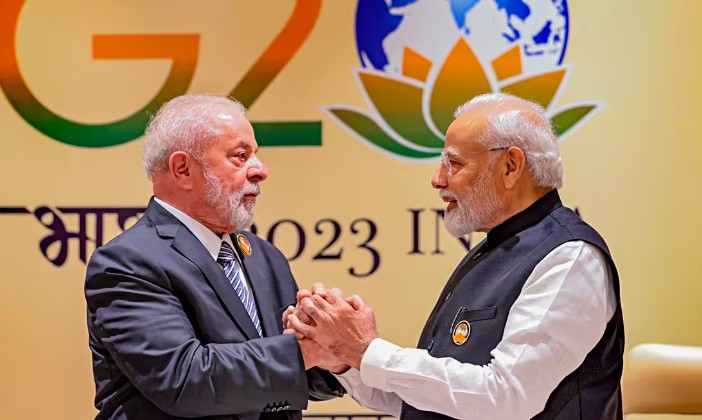Virendra Pandit
New Delhi: A day after the 18th Annual Summit of the Group of 20 (G-20) concluded in the Indian capital, the United States said on Monday it “absolutely believed the event was a success,” as India basked in the glory after praise continued to pour in from overseas.
Responding to a question during a regular press briefing on Monday, the US State Department official spokesperson Matthew Miller told reporters, “We absolutely believe it was a success,” the media reported.
The G-20 members called on all states to uphold the principles of international law including territorial integrity and sovereignty, international humanitarian law, and the multilateral system that safeguards peace and stability.
As the G-20 Leaders’ Summit concluded with great fervor in New Delhi under India’s presidency on Sunday, the United States also called it an “absolute success.”
On Sunday, Prime Minister Narendra Modi handed over the baton for next year’s Annual G-20 Summit to Brazil’s President Lula da Silva.
When asked about Russia’s absence from the New Delhi Leaders’ Declaration, Miller said, “There are members that have a diverse range of views. We believe the fact that the organization was able to issue a statement that calls for respecting territorial integrity and sovereignty and saying that those principles should not be violated is an extremely important statement because that is exactly what is at the heart of Russia’s invasion of Ukraine.”
“It is those very questions so we thought that was an incredibly important statement for them to make,” he added.
High praise came to India which managed what was, hitherto, supposed ‘impossible’ in diplomatic circles. In fact, the Joint Declaration from New Delhi came as the first-ever significant document since the G-20’s formation. All such previous joint communiques were seen as verbose, formal, unimplementable, and worthy of archiving, experts said.
The G-20 group of 19 countries and the European Union (EU) was established in September 1999 as a platform for Finance Ministers and Central Bank Governors to discuss international economic and financial issues. Together, the G-20 countries account for almost two-thirds of the global population, 75 percent of global trade, and 85 percent of the world’s GDP.
With the inclusion of the 55-member African Union (AU) in New Delhi as a full member of G-20, the Group now has 21 members.
The unprecedented New Delhi Declaration continues to make waves across the world as a historic document that overshadows even the UN’s declarations.
The “use or threat of use of nuclear weapons is inadmissible.” G-20 nations said on the first day of the Summit on Saturday in a New Delhi Leaders’ Joint Declaration under the mention of the Ukraine war.
Without naming Russia, they recalled last year’s Bali Declaration and underscored that all states must act in a manner consistent with the Purposes and Principles of the UN Charter in its entirety and called for a “comprehensive, just, and durable peace in Ukraine.” They reminded member states to “refrain from the threat, or use of force, to seek territorial acquisition.”
The New Delhi Declaration reaffirmed that the G-20 is the premier forum for international economic cooperation. The member countries acknowledged that it is not the platform for geopolitical and security issues, although these issues can have consequences for the global economy.
“The peaceful resolution of conflicts and efforts to address crises as well as diplomacy and dialogue are critical. We will unite in our endeavor to address the adverse impact of the war on the global economy and welcome all relevant and constructive initiatives that support a comprehensive, just, and durable peace in Ukraine that will uphold all the Purposes and Principles of the UN Charter for the promotion of peaceful, friendly, and good neighborly relations among nations in the spirit of ‘One Earth, One Family, One Future’,” the New Delhi Declaration read.
India hosted the G-20 Summit (September 9 and 10) for the first time. Extensive preparations were made to portray India’s traditions and strengths. During its presidency, India focused on various issues like inclusive growth, digital innovation, climate resilience, and equitable global health access.

